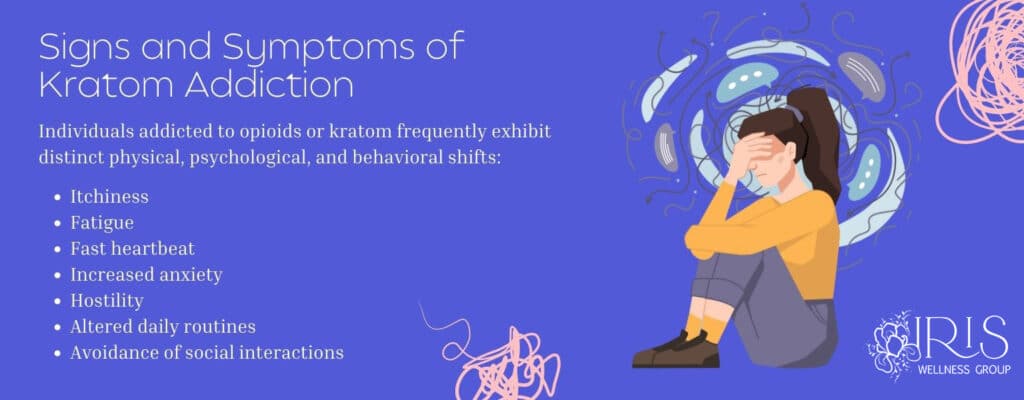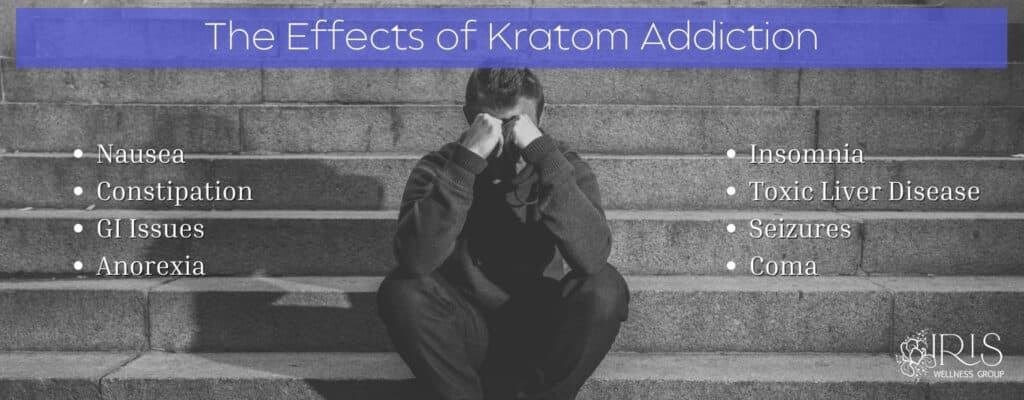Table of Contents

What is Kratom
Kratom, derived from an evergreen tree native to Southeast Asia, has leaves with psychotropic effects. Traditionally, it was used in regions where the tree is endemic to boost energy and work ethic. Laborers ingested these leaves to enhance stamina, while others saw it as an opiate substitute. Today, kratom has garnered global attention, with some countries banning it due to potential risks, side effects, and its addictive nature.
In the US, the Drug Enforcement Administration (DEA) has contemplated classifying kratom as a Schedule I drug and labeled it as a “drug of concern” in their 2017 Drugs of Abuse guide. Meanwhile, the Food and Drug Administration (FDA) has consistently cautioned the public about its risks, underlining its addictive properties, and has not approved it for medicinal use. When consumed in low doses, kratom can have stimulant effects, whereas higher doses can induce sedative, opioid-like symptoms.
The primary psychoactive component in kratom leaves can be smoked, brewed as tea, or encapsulated. Despite the FDA’s warnings, many have turned to kratom for managing chronic pain, mitigating opioid withdrawal symptoms, or for recreational use. Its effects manifest within 5-10 minutes and can last 2-5 hours. Prolonged use may result in symptoms mirroring opioid use disorder.
Is Kratom Legal?
While many assume that kratom is illegal in the US, it’s not entirely true. Kratom is largely classified as a dietary supplement, making its purchase and sale permissible in many states. Nonetheless, some states, such as Alabama, Arkansas, Tennessee, Wisconsin, Vermont, and California, have prohibited it. In addition, the FDA advises against the use of kratom due to potential risks, including addiction, dependence, and abuse.
Is Kratom Addictive?
The question of kratom’s addictiveness is a topic of considerable discussion. While some argue that its non-opioid nature makes it less prone to addiction, others highlight research indicating its potential benefits in opioid withdrawal management. However, given that kratom interacts with the body and mind, there’s a possibility of users developing both physical and psychological dependency.
A key indicator of developing kratom dependency is an increasing tolerance, necessitating larger doses to achieve the same effects. While typically 1 to 4 grams of kratom is sufficient for most, needing 10 grams or more suggests heightened tolerance. Experiencing withdrawal symptoms upon ceasing kratom intake is another strong sign of dependency.
Being addicted implies an inability to stop using a substance, even without physical dependency. This differs from mere dependence, where physical withdrawal symptoms occur upon cessation. Yet, many addicts also develop physical dependencies on their substance of choice. To effectively address addiction, a comprehensive recovery approach is recommended. If you or your loved one is struggling with Kratom Addiction, call Iris Wellness Center today at 423-564-6114

Signs and Symptoms of Kratom Addiction
Research indicates that kratom may lead to dependence and withdrawal symptoms, akin to the effects of substances like heroin and prescription pain medications. This is because kratom’s chemical compounds activate opioid receptors in the brain.
Stopping kratom intake can trigger painful, and in some cases, life-threatening symptoms. Consequently, many users report kratom addiction which typically progresses through stages:
- Trial stage: Occasional use without continuation.
- Regular use: Continual intake due to benefits or symptom relief.
- Increasing risks: Users might overlook dependence signs, feeling no immediate harm.
- Dependence: Emergence of withdrawal symptoms like muscle aches and mood swings.
- Substance use disorder: A relentless need for the drug, marked by psychological reliance and risk-taking to maintain usage.
Individuals addicted to opioids or kratom frequently exhibit distinct physical, psychological, and behavioral shifts:
Physical Symptoms:
- Effects, such as euphoria and alertness, can manifest shortly after consumption but may turn adverse with prolonged use.
- Withdrawal symptoms resembling opioids include shaking, sweating, and drug cravings, persisting weeks post last dose.
- Prolonged kratom use, driven by the desire to dodge these symptoms, can evolve into a compulsive disorder.
- Other signs of addiction include:
- Itchiness
- Muscle pain
- Nausea
- Constipation
- Runny nose
- Fatigue
- Frequent urination
- Dry mouth
- Fast heartbeat
- Chills
- Drowsiness
- Physical changes, like drastic weight loss or deteriorating appearance, can also hint at addiction.
Psychological Symptoms:
- Though some use kratom for mental health relief, its efficacy remains uncertain.
- Signs of addiction might comprise:
- Sleep disturbances
- Increased anxiety
- Irritability
- Hostility
- Mood fluctuations
- Aggressiveness
- In rare situations, kratom might induce psychosis, characterized by hallucinations or severe paranoia.
Behavioral Changes:
- An increased tolerance to kratom makes quitting difficult without experiencing withdrawal.
- As addiction takes hold, one might exhibit:
- Altered daily routines and sleeping patterns.
- Lethargy, affecting job performance and personal hygiene.
- Avoidance of social interactions and declining participation in activities.
- Persistent kratom use may lead to mood instabilities, making interactions with loved ones challenging and pushing the individual towards isolation.

The Effects of Kratom Addiction
While kratom is often found in health shops and cited for mood enhancement, energy boosts, pain relief, and opioid withdrawal mitigation, its long-term effects can be worrisome, leading to addiction, overdose, and even fatality.
Substance abuse disorder, affecting millions in the U.S., has broad health, mental, and social implications, with many sufferers also contending with other mental health issues, exacerbating symptoms of both conditions. Recognizing the effects of kratom addiction is crucial:
Short-Term Effects:
- Vary based on dosage: higher doses bring opioid-like effects (sedation, pain reduction), while smaller doses stimulate (increased sociability, energy).
- Quick onset behavioral effects include heightened sociability and mood elevation.
- Physical effects include pain relief and energy boosts.
- Over-reliance can lead to diminishing benefits and increased side effects.
Long-Term Effects:
- Nausea and constipation are prevalent, potentially complicating gastrointestinal conditions.
- Anorexia, with dangerous weight loss, can develop.
- Other symptoms include insomnia, cheek hyperpigmentation, rapid heartbeat, toxic liver disease, seizures, and coma.
- Combining kratom with prescription drugs can lead to abnormal brain functions, resulting in communication difficulties, confusion, and severe headaches.
Overdosing on kratom, especially when combined with substances like fentanyl, can be life-threatening. Overdose symptoms include hallucinations, confusion, rapid heart rate, respiratory issues, seizures, and coma. Immediate medical attention is vital for suspected overdoses.
Common Kratom Withdrawal Symptoms
When an individual develops a physical dependency on substances like kratom, their body will respond with withdrawal symptoms once the substance is absent. Common symptoms exhibited by people discontinuing kratom include:
- Intense cravings
- Mood swings or irritability
- Heightened anxiety
- Muscular pain
- Excessive sweating
- Feeling nauseous
- Displays of aggression
- Involuntary muscle twitches
- A sense of unease or restlessness
- Difficulty sleeping or insomnia
- Sudden emotional reactions
The intensity and duration of these symptoms largely hinge on the dosage and duration of kratom consumption. In general, those who have ingested substantial quantities over extended periods are likely to experience more pronounced and prolonged withdrawal symptoms compared to infrequent or low-dose users. However, individual reactions can greatly vary, making each person’s withdrawal experience unique.
What to Expect from Iris Wellness Group’s Kratom Drug Program in Tennessee
Iris Wellness Group’s kratom drug rehab center in Tennessee stands as a beacon for those seeking recovery. Our dedicated specialists are committed to helping you regain your health and reclaim your life, one step at a time. With a team of seasoned medical professionals and certified counselors, we ensure every interaction is filled with genuine care, compassion, and support.
At Iris Wellness Group, we offer medically-assisted treatments paired with evidence-backed therapeutic practices. Each treatment plan is uniquely tailored to fit individual needs, ensuring optimal care. Our holistic approach addresses the physical, emotional, and mental aspects of addiction recovery. Moreover, our integrated cognitive and behavioral therapies delve into the root causes of addiction, equipping you for lasting change. Beyond your time with us, know that we stand by you, supporting your journey throughout life.
End Your Kratom Abuse and Begin Your Kratom Addiction Recovery!
Types of Treatment for Kratom Addiction
Currently, there are no medically endorsed treatments specifically designed for kratom dependence or addiction.
However, standard treatments for substance misuse and addiction usually encompass three primary stages: stabilization, therapeutic intervention, and ongoing recovery. Detoxification under medical supervision often serves as the initial step, where the focus is on safe and comfortable withdrawal from the substance. Following detoxification, a combination of behavioral therapies and medications is often recommended.
A holistic treatment plan should be tailored to cater to an individual’s unique requirements and may include:
- Medical Detoxification: This process ensures you withdraw from the substance in a medically stable environment, sometimes aided by medications.
- Inpatient Residential Rehabilitation: Here, individuals reside at the rehab center throughout their treatment. The center provides continuous care, support, and a variety of therapeutic interventions to address addiction and its underlying causes.
- Outpatient Rehabilitation: In this arrangement, individuals stay at home but visit the treatment facility regularly. They engage in therapy sessions and get the necessary care and support for rehabilitation.
- Aftercare and Alumni Program: Vital for maintaining sobriety post-treatment, aftercare might encompass various strategies like individual counseling, residing in halfway houses, attending support groups such as Narcotics Anonymous, using telehealth resources, and, in some situations, continuing with medications. Some people benefit from Medication-Assisted Treatment (MAT) which helps to reduce cravings and withdrawal symptoms, aiding in long-term sobriety.
While specific treatments for kratom addiction haven’t been conclusively studied, behavioral therapies used for opioid dependence might be applicable. Such therapies could include:
- Contingency Management (CM): This approach uses positive reinforcement, where individuals are given tangible rewards for displaying positive behaviors, such as consistent negative drug test results.
- 12-Step Facilitation Therapy: Aimed at encouraging individuals to engage with 12-step groups like Narcotics Anonymous.
- Motivational Therapies: These are designed to enhance an individual’s willingness to participate in structured treatment.
- Cognitive-Behavioral Therapy (CBT): Here, individuals are taught new cognitive and behavioral patterns, empowering them to manage life without relying on substances. This therapy imparts skills to prevent relapse and maintain sobriety.
Benefits of Seeking Treatment For Kratom Addiction in Chattanooga, TN
Kratom addiction in Chattanooga, Tennessee, can feel overwhelming, often causing feelings of isolation. But Iris Wellness Group offers a sanctuary with medical professionals, therapists, and peers ready to guide you on the path to recovery.
When pursuing Kratom addiction treatment in Chattanooga, you’ll be provided with comprehensive resources tailored to support both your physical and mental recuperation. Alongside this, you’ll be equipped with the necessary tools to maintain a sustained, healthy lifestyle.
Three significant benefits of seeking such treatment include:
- Structured Treatment and Accountability: Rehab centers, whether residential or outpatient, offer a well-defined program. With constant supervision in residential settings and regular check-ins in outpatient treatment, they provide a safe space devoid of triggers. Creating a balanced routine tailored to individual needs becomes a primary recovery goal. This structured approach fosters stability during tumultuous times. Emphasizing therapeutic sessions, promoting healthy activities, and fostering peer support, these centers lay the groundwork for a continued healthy path post-treatment.
- Holistic Health Enhancement: Beyond mere addiction recovery, these centers prioritize your overall well-being. Substance abuse can drain the body of vital nutrients, leading to fatigue and disrupted sleep patterns. Recognizing this, centers ensure nutrient-rich meals, promoting overall mood enhancement and physical well-being. To fortify the mind-body connection, activities like fitness classes are incorporated. This holistic approach not only curbs cravings but establishes robust habits for life.
- Building Community Bonds: The journey to recovery, while daunting, needn’t be solitary. Treatment centers in Chattanooga stand out for the communal support they offer. The medical team’s expertise is complemented by the solidarity among peers undergoing similar struggles. These genuine relationships foster understanding and hope, underscoring the reality that, with collective strength, overcoming addiction is achievable.
In essence, Kratom addiction treatment in Chattanooga offers a structured, holistic, and community-centric approach, lighting the path towards a drug-free life.
Is Kratom Rehab Covered by Insurance?
Yes, plenty of kratom rehab centers accept various forms of in-state and out-of-state insurance plans. To find out whether or not your insurance will cover the full or partial cost of your treatment, simply provide your insurance information on our verify insurance form and an Iris Wellness Group admissions representative will inquire on your benefits or call us now at 423-564-6114.
Get Chattanooga, TN Kratom Addiction Treatment at Iris Wellness Group
Struggling with substance use disorder can often seem like a relentless and solitary fight. If kratom addiction is affecting you or someone close to you, Iris Wellness Group is committed to guiding you towards healing and recovery from this complex ailment. Treatment centers delve into root causes, helping break the chains of addiction and reconnecting you with the joys of life.
At our center, we prioritize understanding and professional care, aiming to restore the life you once cherished before substance dependency took hold. Our tailored programs ensure a holistic approach, equipping you with the vital tools to sustain sobriety and enhance life quality.
Reach out to us to explore our specialized kratom addiction treatment options.
Kratom Frequently Asked Questions
What Does Kratom Do?
Kratom, a plant native to Southeast Asia, is known for its dual effects depending on the dosage. At low doses, it acts as a stimulant, making users feel more energetic. At higher doses, it has sedative effects, producing euphoric sensations and dulling emotions and sensations. Its active compounds, mitragynine and 7-hydroxymitragynine, interact with opioid receptors in the brain, leading to pain relief, pleasure, and decreased anxiety, but also potential side effects and risks.
Is Kratom an Opioid?
Kratom is not an opioid, but it has opioid-like effects because its active compounds, mitragynine and 7-hydroxymitragynine, bind to the same opioid receptors in the brain as opioids do. This action can produce similar effects to opioids, such as pain relief and euphoria, but kratom is chemically different from traditional opioids.
How Long Does Kratom Stay in Your System?
The duration kratom stays in the system varies, but it’s generally detectable for several days after use. Its half-life is approximately 24 hours, meaning it takes about a day for half of the substance to be eliminated from the body. Kratom can be detected in urine for up to a week after use, depending on factors like frequency of use, dosage, and individual metabolism.
Is Kratom Addictive?
Kratom can be addictive. Regular use, especially in large doses, can lead to dependence, where users may experience withdrawal symptoms when they stop taking it. These symptoms can include muscle aches, irritability, mood swings, and cravings, similar to opioid withdrawal.
How Addictive Is Kratom?
The addictive potential of kratom varies among individuals. While it’s less addictive than traditional opioids, regular and prolonged use, particularly in high doses, can lead to addiction. Users may develop tolerance and dependence, feeling the need to continue using kratom to avoid withdrawal symptoms.
Can You Get Addicted to Kratom?
Yes, it is possible to become addicted to kratom. Regular use, especially in higher doses, can lead to physical dependence and addiction. Users may find themselves using kratom more frequently or in larger amounts to achieve the desired effects.
How Long Does It Take to Get Addicted to Kratom?
The time it takes to develop an addiction to kratom can vary. Some users may develop dependence and addiction after a few weeks of regular use, while others may take longer. Factors like dosage, frequency of use, and individual susceptibility play a role in addiction development.
Is Kratom Physically Addictive?
Kratom can lead to physical addiction. Regular users may experience physical withdrawal symptoms when they stop using it, indicating physical dependence. These symptoms can include muscle aches, irritability, and cravings, similar to opioid withdrawal.
Who is Chattanooga Kratom Addiction Treatment Designed For?
Chattanooga kratom addiction treatment caters to individuals living in Chattanooga, Red Bank, Signal Mountain, Lookout Mountain, Southeastern Tennessee, Northern Georgia, or surrounding areas. These services are ideal for those who do not require medically supervised detoxification, have a stable and supportive home and work environment, and are self-motivated in their journey towards recovery.
How Common Is Kratom Addiction Treatment?
Kratom addiction treatment is becoming more common as the use of kratom increases. While it’s not as widely recognized as treatment for traditional opioid addiction, the rising prevalence of kratom use has led to a greater need for specialized treatment programs that address its unique effects and withdrawal symptoms.
Can You Go to Rehab for Kratom?
Yes, individuals can go to rehab for kratom addiction. Rehabilitation centers that specialize in substance abuse can provide treatment for kratom addiction, including detoxification, therapy, and support services to help users overcome their dependence and manage withdrawal symptoms.
What Do Drug Treatment Centers Use for Kratom Addiction?
Drug treatment centers typically use a combination of therapies for kratom addiction, including behavioral therapy, counseling, and support groups. Since there are no FDA-approved medications specifically for kratom addiction, treatment focuses on managing withdrawal symptoms and addressing the psychological aspects of addiction.









